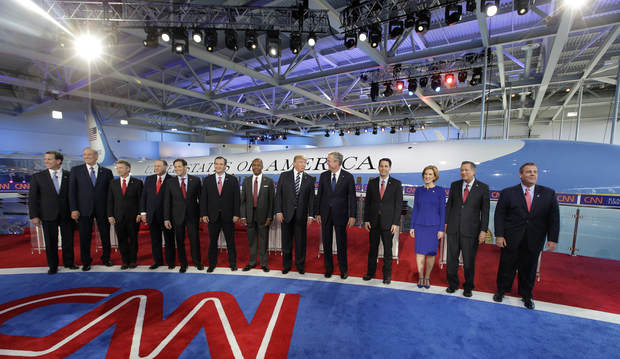Republican primary presidential debate highlights candidates, personal attacks
(AP Photo) Republican presidential candidates, from left, former Pennsylvania Sen. Rick Santorum, former New York Gov. George Pataki, Sen. Rand Paul, R-Ky., former Arkansas Gov. Mike Huckabee, Sen. Marco Rubio, R-Fla., Sen. Ted Cruz, R-Texas, retired neurosurgeon Ben Carson, businessman Donald Trump, former Florida Gov. Jeb Bush, Wisconsin Gov. Scott Walker, businesswoman Carly Fiorina, Ohio Gov. John Kasich, and New Jersey Gov. Chris Christie take the stage during the CNN Republican presidential debate at the Ronald Reagan Presidential Library and Museum on Wednesday, Sept. 16, 2015, in Simi Valley, Calif.
September 18, 2015
From the earliest moments of the first round of the September 16th Republican primary presidential debate at the Ronald Reagan Presidential Library, it was clear that this would be vastly different from the typical presidential debate. Between the arrangement of the debates by poll rankings, the presence of candidates like business magnate Donald Trump and retired pediatric neurosurgeon Ben Carson, and the more than encouraged personal attacks between the contenders, the debate had many stand-out moments.
The first round of debates began with bottom-of-the-pack contenders Lindsey Graham, Bobby Jindal, Rick Santorum, and George Pataki focusing on issues such as ISIS, the Supreme Court’s marriage equality ruling, religious freedom, and the issue of birthright citizenship for so-called “anchor babies.”
Graham took a hardline anti-immigration and anti-birthright citizenship-centered stance from the beginning, declaring that “amnesty is doing nothing. I’d like to stop bastardizing citizenship.”
George Pataki, however, supported birthright citizenship as well as naturalization of illegal immigrants, insisting that it was more important to incorporate and assimilate immigrants in to American society than to deport them.
Despite being a child of two immigrants, Bobby Jindal also took an anti-immigration stance, especially concerning the Mexican border, saying that he has “never been for amnesty.”
“I will never be for amnesty,” Jindal continued. “I’m for securing the border.”
Rick Santorum remained relatively quiet on this subject, maintaining his more moderate but still anti-amnesty status.
The recent legalization of nationwide marriage equality was next on debate roster.
“It’s against natural law, it’s against God’s law, and we shouldn’t condone it in America,” uttered Rick Santorum, making it clear that this wouldn’t be the group to respect the Supreme Court’s decision.
Jindal dodged the issue itself, instead bringing up the recent Kim Davis controversy and his own angle on the marriage equality debate, arguing that religious freedom is being attacked by the left’s support of gay rights. “By far,” Jindal said, “the biggest discrimination in America right now is against Christians.”
Though the debate continued with calls for more “American boots on the ground,” in Iran from Lindsey Graham and a series of attacks on both President Obama and fellow candidate Donald Trump from all participants, the first debate ended on a softer, more moderate note from Graham.
“Yes, I will say nice things about democrats,” promised Graham. “Yes, I will be willing to work with them. Yes, I will support America over the two party system.”
And then, minutes later, the primetime debate between the eleven Republican frontrunners began.
Now, to be honest, I feel a certain obligation to insert a piece of editorial commentary here. From my perspective, it was obvious that this debate, to be blunt, made a mockery of a political system that is already terribly flawed. Personal attacks were not only condoned but encouraged by the moderators and, sure, it was entertaining, but it made the politically aware amongst us feel as though we were watching a spectacle instead of a professional, respectful debate on the issues.
There were attacks on not only Democratic contenders Hillary Clinton and Bernie Sanders but on fellow Republicans. When self-proclaimed libertarian Rand Paul accused Donald Trump of running a campaign based on “personal and appearance attacks,” Trump responded by saying that he “never attacked [Paul] on his looks – and believe me, there’s a lot of subject matter there. Rand Paul shouldn’t even be on this stage.”
Frankly, from that point on, it was hard to sift through the drama to the heart of the issues.
Only Jeb Bush and Chris Christie managed to, for the most part, avoid the personal attacks; Christie even went as far as calling out Carly Fiorina and Trump.
“We don’t want to hear about your careers,” Christie spat across the stage. “Let’s start talking about those issues [middle class reform] tonight and stop this childish back and forth between the two of you.”
Very quickly, the primetime debate became more about how the candidates differentiated themselves and less about the issues Americans care about.
The only true issues the candidates managed to discuss without attacking each other were the Iran Nuclear Deal and recent Planned Parenthood controversies.
Unanimously, the Republicans were against the Iran deal, some calling for a change of regime in Iran, some criticizing the method of the Iran deal, and some harping on the fact that the U.S. made the deal at all. Ted Cruz went so far as to say, “If I am elected president, the first thing I’ll do in office is rip to shreds this catastrophic Iran deal.”
Chris Christie agreed, bringing terrorist group ISIS into the mix.
“I will not meet with, and I will not agree to anything with a country that says death to us and death to Israel and holds our hostages while we sign agreements with them,” said Christie.
The only other somewhat-civil discussion centered around Planned Parenthood and women’s rights and representation. Fiorina, the only female Republican candidate, supported women’s rights but was vehemently against Planned Parenthood funding.
“We ought to recognize that women are not a special interest group. Women are the majority of the nation. We are half the potential of this nation. And this nation will be better off when every woman has the opportunity to live the life she chooses,” said Fiorina.
Each of the Republican Candidates agreed that defunding Planned Parenthood was the right decision for the country, although Ben Carson, the only candidate with medical experience, was suspiciously quiet on the topic. They cited the highly controversial pro-life videos that many experts have claimed were falsified or at the very least heavily edited in order to justify taking affordable healthcare from millions of women. Only Chris Christie seemed to have a true, defensible pro-life stance, saying that “you need to be pro-life for more than just the time in the womb.”
As the heated and often simply ridiculous primetime debate wound down, Carly Fiorina made perhaps the best point of the night when she discussed what her choices would be as the next president.
“All of us will be revealed over time,” Fiorina said. “And you know what a leader does? They challenge the status quo.”









